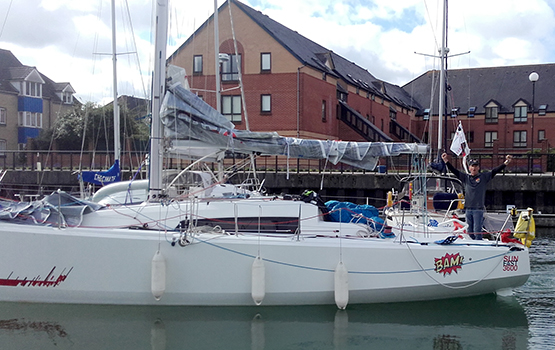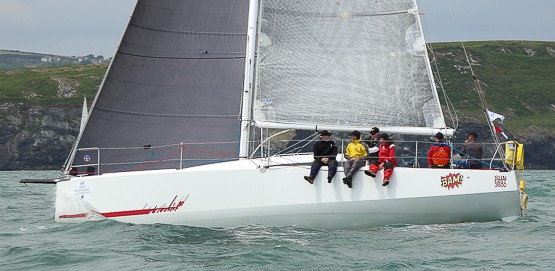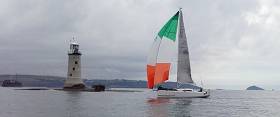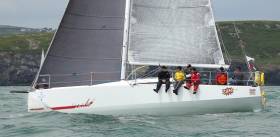Displaying items by tag: Solo Fastnet
Close Solo Fastnet Race For Howth Yacht Club's Conor Fogerty
Conor Fogerty's Sunfast 3600, Bam from Howth Yacht Club continued her 2016 campaign with the inaugural SORC (Solo Offshore Racing Club) run, Solo Fastnet, from Cowes to the Fastnet, finishing at Plymouth, a distance of 605 nautical miles, writes BAM shore manager John Forde.
An action packed delivery from Howth to Ocean Village Marina in Southampton, saw 20.4 knots clocked off Portland Bill on a broad reach fling a battered delivery Figaro Main and a beautifully cut Philip Watson no.5 /reaching sail. This, perhaps, should have foretold what was in store for the 46 plucky contestants who had gathered for this iconic sailing test. The nationalities, mainly British and French, included German, Finnish, Australian and two Irish entries. Besides Conor's class 1 IRC rated Bam, Jim Schofield from Poolbeg YC had entered his classic Nicholson 32 'Thisbe', the lowest ranked boat in class 3 on an IRC rating of .848.
The Fastnet Race is one of the great RORC races and memories will remain long of the tragic 1979 Race. Recent races have witnessed some pretty tough racing conditions for what are mainly Corinthian sailors, albeit some with tremendous sailing experience and expertise to include previous OSTAR ( Plymouth - New Port RI ) participants and winners, Trans Quadra trans Atlantic race winners, as well as Double Handed RORC Fastnet winners. The last big blow Fastnet of 2007 saw just one in five boats reach and round the Rock.
In contrast, there were only two retirees who did not come to the line, and eventually 19 out of 46 managed to finish.
 Conor Fogerty on his Sunfast 3600, prepares to leave Ocean village marina for the Solo Fastnet start. Photo: John Forde
Conor Fogerty on his Sunfast 3600, prepares to leave Ocean village marina for the Solo Fastnet start. Photo: John Forde
However that was as good as it got for the fleet at the 11.30 start line. Average wind speeds from the South West of 25 knots gusting 30/35 together with an ebbing tide saw 10–foot standing waves off the Needles.
Post race, a local sailor based in Cowes, reported having heard of these legendary standing waves off the Needles point, but never having witnessed such conditions, until this race began that is.. The fleet therefore started and continued on a cold and wet, wind tossed beat into the first night and beyond.
There were many early casualties due to boat failure; auto pilot / charging issues, serious gear failure, sails/sheets fouling sail drives and indeed physical casualties, exhaustion/sickness. Broken ribs in one case and a tooth knocked out in another were mere irritations for two participants who carried on.
Our intrepid Howth hero started on full main and when questioned after by a fellow racer as to his sanity, replied “ I blew my first reef and had no option “, narrowly avoiding a port – starboard collision with a quick thinking competitor who allowed him pass in front.
A ripped leech on a J2, a blown halyard and a quickly deteriorating main completed the damage inventory.
Reports of no sleep for the first 24 hours was common as progress was made down the Inshore stretch of the race along the Jurassic Coast, crossing outside Poole Bay, Portland Bill, Lyme Bay on to Start
Point the Lizard and Lands End to the first tactical call at the Lands End TSS The TSS could not be entered save incurring time penalties.
Most of the lead boats went south towards the Scilly Isles whilst following boats split in between. There was an early lead on time for French Class 2 Raging Bee in a JPK 1010. The lead boats comprised a group of French in a range of JPKs , and the English and lone Irishman in the 3600's, The SF 3200's also dicing at the front, with the only female entry Deb Fish more than holding her own.
The first night saw a large proportion of retireses. This growing band of brothers gathered, ashore at the RWYC and Sutton Marina and local Hostelries in the magnificently situated maritime City of Plymouth.
As the band of retirees gathered after a second gale battered the fleet off the South coast of Ireland on the 3rd day of racing the pace increased. Both offshore and ashore!
The remaining open 40 with Finnish Skipper Ari Kansakoska blew his main but still managed to finish, nursing it home in less decreasing winds on the return leg. Bam, Bellino and several other Sunfasts plus the French in the JPK 1010's swapped the lead, with Bam stealing a decisive tactical march before the Fastnet and rounding First.
Alas no prizes at half time....
The lead continued to change on the return leg with light airs now predominating to the TSS at Lands End/Scilly Isles.
On Wednesday night, day 4, a group of new found Irish supporters gathered round various devices to track the latest progress on the superbly functional and informative YB tracking system. Before last orders (late) in The Fishermans Arms at the top of one of Plymouth's many steeped cobbled 18th century streets, it seemed a second tactical battle had been won by Fogerty over the experienced Rob Craigie in Bellino.
Bellino went in under the headland at Lizard Rock, about 40–miles to finish in a dying breeze and slowed to 1.5 knots. Bam gybed south in an effort to keep the A2 filled. We could see three knots on the tracker compared to Bellino's 1.5. It seemed a first on the water and class was there instead of simply accepting a “follow the leader home” second, as Bellino had 3 miles on Bam.
'Fortune did not follow this brave move'
Alas on this, the occasion of his first solo offshore race, despite huge offshore big boat and fully crewed experience, fortune did not follow this brave move.
A large hole appeared off shore and the inshore boats found some land breeze to creep on towards the finish in Plymouth Sound, early next morning Thursday the 7th July.
A welcoming committee of competitors and friends greeted each finisher with a great cheer and a cold beer and in some case a much needed fag....
Time to party, boats were docked, tied up and left as cold liquid refreshments were the breakfast choice of all, despite most sailors reporting snatches of 20 mins max and little food. Somehow 35 knots don't make for fine dining or even dining in cases, it seems....
When the skipper was informed that the shore support was wrecked, later in the day the question rang out “ how could you be wrecked tracking the race (Tactical Support ) when we're after doing a 5 day solo “? Try 7 days ashore with a bunch of thirsty sailors and you'll know how...
Bam finished 4th in Class and for a first Solo in such illustrious company this was a tremendous achievement. The eventual winner on corrected was Will Sayer in his Class 3, Sigma 33C due to the fleet compressing at points during the leg back. He had seriously contemplated giving up at Lands End on the way out when cast adrift from the top markers...
 HYC's Bam competing in last month's Round Ireland race. Sailing solo last week, skipper Conor Fogerty was in contention in the Solo Fastnet race Photo: Afloat.ie
HYC's Bam competing in last month's Round Ireland race. Sailing solo last week, skipper Conor Fogerty was in contention in the Solo Fastnet race Photo: Afloat.ie
The remainder of 2016 sees Bam compete in a number of RORC fully crewed events to include the “Ile d Òuessant ” in August and finally the Middle Sea Race in October to complete a remarkable year, after a first in The RORC 600 and a third in the Round Ireland race. Conor and Rob Craigie are both going for the RORC top sailor of the year award a with a one–all at this point .
Next year is the OSTAR and Conor will be commencing a sponsorship campaign to fund this expensive attempt when he again attempts to put Irish amateur sailing on the world map.
Conor Fogerty's BAM from Howth Yacht Club is lying second overall in class and fourth overall in the inaugural Solo Fastnet race this morning. Fogerty is expected to finish the five day course tomorrow.
The Royal Western Yacht Club of England (RWYC) has certified this ‘Solo Fastnet’ as an official qualifier for the 2017 OSTAR race in May 2017. The category 2 race was designed by solo sailors for solo sailors who want to test their skills and endurance in an offshore race across the unpredictable North Atlantic Ocean, and is open to any IRC rated boat or class boats racing under their class rules.
Conor, who celebrated his 45th birthday during the race, has done more than 300,000 nautical miles of offshore sailing, including 30 Transatlantic and 2 Round the World trips - one as skipper on Cardiff for the Clipper Round the World Race in 2005/06. New to short handed sailing on his Jeanneau Sun Fast 3600 ‘Bam’, he won the 2-handed ISORA series in 2015 and was 6th overall. Many of you will also have read of his offshore racing exploits this year including winning IRC Class 3 in the Caribbean 600, earning him the 'Afloat Sailor of the Month' in February and also finished 3rd in Class 3 in the recent Round Ireland Race.
His practice by taking ‘Bam’ single-handed from St Martin to the Azores earlier this summer is part of his calculated regime to prepare for this event. Conor reported ‘I'm keen to progress in the single handed sailing, and see this event as a great opportunity to race against far more experienced single handed sailors, and perhaps nip at their heels!’ It’s no secret that Conor also has eyes on the 2017 OSTAR Race. The OSTAR (The Original Single-handed Transatlantic Race) founded by Cockleshell hero Blondie Hasler in 1960 and run every four years since and the ‘TWOSTAR’, first held in 1981, will both start from Plymouth heading for Newport, Rhode Island on 29th May 2017.
Saturday’s inaugural SORC Round the Rock Race is a Category 2 (ISAF) race and designed by solo sailors for solo sailors. It’s heralded as being ‘for Corinthian sailors who want to test their skills and endurance in a substantial offshore race - a race that only requires a week's holidays to complete but still offers the excitement and challenge of nights at sea combined with the unpredictable nature of North Atlantic weather’.
The Notice of Race specifies the experience required to participate as: ‘The skipper is required to have substantial offshore short handed sailing experience including solo nights offshore. The race is challenging especially for a solo skipper, requiring well developed navigation skills, practiced boat handling in both strong and light conditions and familiarity with managing the effects of fatigue and limited sleep. If you are in any doubt regarding your experience you are encouraged to contact the RC for guidance.
Rob Craigie, Race Director of the SORC Round the Rock Race, said: “The Round the Rock Race enabled us to establish a long distance UK-based iconic solo race which would be both tactically and strategically demanding for sailors, but could be completed in a week. There is also a strong social element to the event, and we look forward to reaching Plymouth and berthing in the heart of the city in Sutton Harbour before celebrating at the race party.”
Track Conor Fogerty's progress here

























































